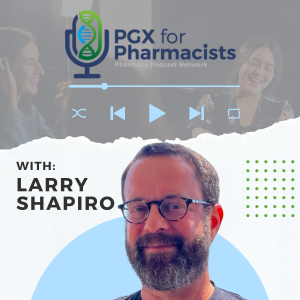
Thursday Oct 06, 2022
Polypharmacy and PGx Guided Therapy in PTSD | PGx For Pharmacist
Dr. Larry Shapiro is a clinical psychologist that started back in 1990 but quote on quote retired to become a financial advisor. He was having a discussion with his brother one day, who was a career officer in the Army, returning from Afghanistan. That make Dr. Shapiro to re-think about his contributions to his community, so he got his license back, trained in military trauma, and started again as a psychologist in 2014. He started at St. Louis Behavioral Medicine Institute specializing in treatment of OCD, panic disorder, social anxiety disorder, simple phobias, depression, and combat trauma. Last year he attended the annual Boston Trauma Conference and heard for the first time about the use of psychedelic medicines for treatment of trauma. So after a 150 hour certification program at Integrative Psychiatry Institute he became certified in psychedelic-assisted psychotherapy which now is part of his current practice. Just this year in January he went into private practice so he can focus more on psychedelics. He is also an adjunct instructor in the department of psychiatry at Washington University in St. Louis and a clinical consultant for psilocybin research at Healthy Minds Lab at Washington University. Post-traumatic stress disorder (PTSD) which is one of the most common psychiatric disorders which affects about 8 million adults at some point in their lifetime in the United States. But it is not clear as to why only some people who experience a traumatic event develop PTSD. Some people say it’s a social construct but in the largest and most diverse genetic study of PTSD to date, scientists from University of California San Diego School of Medicine and more than 130 additional institutions participating in the Psychiatric Genomics Consortium found that PTSD has a strong genetic component similar to other psychiatric disorders. Genetics seem to accounts for between 5 and 20 percent of the variability in PTSD risk following a traumatic event. Resources: https://health.ucsd.edu/news/releases/Pages/2019-10-08-study-reveals-ptsd-has-strong-genetic-component.aspx
No comments yet. Be the first to say something!